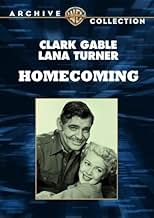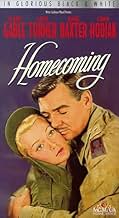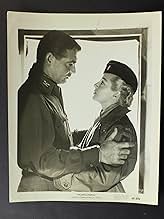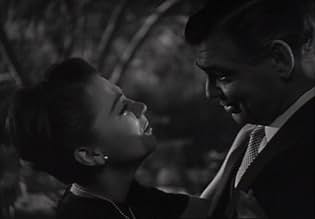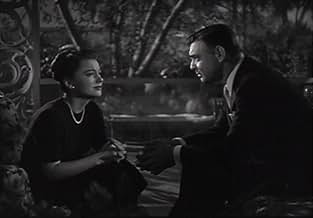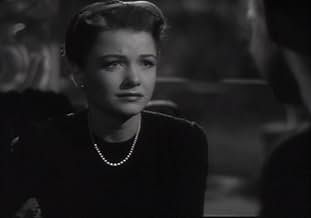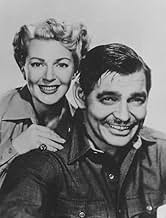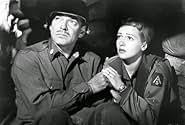IMDb RATING
6.8/10
1.2K
YOUR RATING
At the end of WW2, aboard a repatriation ship, an Army doctor reminisces about his war years while being interviewed by a reporter.At the end of WW2, aboard a repatriation ship, an Army doctor reminisces about his war years while being interviewed by a reporter.At the end of WW2, aboard a repatriation ship, an Army doctor reminisces about his war years while being interviewed by a reporter.
- Director
- Writers
- Stars
- Awards
- 4 wins total
John Albright
- Corpsman
- (uncredited)
Frank Arnold
- Maitre d'Hotel
- (uncredited)
Peggy Badley
- Nurse Betty Simpson
- (uncredited)
Art Baker
- Williams, Reporter on Transport Ship
- (uncredited)
Gregg Barton
- Captain
- (uncredited)
Nanette Bordeaux
- Nurse
- (uncredited)
- Director
- Writers
- All cast & crew
- Production, box office & more at IMDbPro
Featured reviews
Movies like this one are discoveries. Mervyn LeRoy was a director that always knew where to go for a good story and get amazing performances out of his actors. In this film he demonstrates how to create a movie that holds the viewer's attention. It is based on a story by Sidney Kingsley and was adapted by Jan Lustig.
The movie shows the American cinema at its best as it combines a look to WWII and a forbidden love, something that probably had a hard time passing the censor's scissors. Mr. LeRoy makes the picture highly engrossing because of the way he presents the story. Men and women, for the first time were in the front lines; the men as combatants, or in this case, a doctor and the women as nurses, or filling in for the jobs the men couldn't do because they did the fighting.
Clark Gable was an actor that made this picture the joy it is to watch by making us believe he is this surgeon, Dr. Lee Johnson, a man that awakes to reality when he has to deal first hand with treating the wounded soldiers. Mr. Gable casts such a virile shadow in his best work that we know where he stood all the time. His Dr. Johnson shows the strain of the stress of war, the loyalty to his wife at home and the sudden love he finds for "Snapshot" McCall. He remains throughout the film focused in helping the soldiers, until the passion he feels for his nurse, gets the best of him.
Lana Turner is the real surprise of the movie. She is playing a role that probably would not have been offered to her because of the heat and glamour she projected. Her nurse McCall is a woman that life has made a cynic because of the tragedy in her own life and the fact that she is separated from her young son. The magnetism between Ms. Turner and Mr. Gable is what keeps us interested in the movie. Lana Turner shows she had the potential for playing dramatic parts that were not offered to her; she was type-casted as the siren, or the sophisticate in most of her work, but she had the range and the potential that probably only Mr. LeRoy, who discovered Ms. Turner, saw she had. Only a director like Mr. LeRoy could elicit this performance from Ms. Turner.
Anne Baxter is the wife that stays home hoping her man will come back alive. Her Penny Johnson makes her appear as insecure because she perceives her husband's affection might lie with the nurse that he complains to her at the beginning of his correspondence. John Hodiak plays the friend, Dr. Sunday, a man who has his feet on the ground and believes he should help the poor people of his area, instead of the society types that Dr. Johnson attracts.
The movie is satisfying because is tells a good story with characters one is easily identified with. Mr. LeRoy was the one that got all the elements together and gave us this classic film that is timeless.
The movie shows the American cinema at its best as it combines a look to WWII and a forbidden love, something that probably had a hard time passing the censor's scissors. Mr. LeRoy makes the picture highly engrossing because of the way he presents the story. Men and women, for the first time were in the front lines; the men as combatants, or in this case, a doctor and the women as nurses, or filling in for the jobs the men couldn't do because they did the fighting.
Clark Gable was an actor that made this picture the joy it is to watch by making us believe he is this surgeon, Dr. Lee Johnson, a man that awakes to reality when he has to deal first hand with treating the wounded soldiers. Mr. Gable casts such a virile shadow in his best work that we know where he stood all the time. His Dr. Johnson shows the strain of the stress of war, the loyalty to his wife at home and the sudden love he finds for "Snapshot" McCall. He remains throughout the film focused in helping the soldiers, until the passion he feels for his nurse, gets the best of him.
Lana Turner is the real surprise of the movie. She is playing a role that probably would not have been offered to her because of the heat and glamour she projected. Her nurse McCall is a woman that life has made a cynic because of the tragedy in her own life and the fact that she is separated from her young son. The magnetism between Ms. Turner and Mr. Gable is what keeps us interested in the movie. Lana Turner shows she had the potential for playing dramatic parts that were not offered to her; she was type-casted as the siren, or the sophisticate in most of her work, but she had the range and the potential that probably only Mr. LeRoy, who discovered Ms. Turner, saw she had. Only a director like Mr. LeRoy could elicit this performance from Ms. Turner.
Anne Baxter is the wife that stays home hoping her man will come back alive. Her Penny Johnson makes her appear as insecure because she perceives her husband's affection might lie with the nurse that he complains to her at the beginning of his correspondence. John Hodiak plays the friend, Dr. Sunday, a man who has his feet on the ground and believes he should help the poor people of his area, instead of the society types that Dr. Johnson attracts.
The movie is satisfying because is tells a good story with characters one is easily identified with. Mr. LeRoy was the one that got all the elements together and gave us this classic film that is timeless.
Ulysses ,what a name for a major whose odyssey took place in WW2,who learned after his "voyage" that success is no success at all,that selfishness leads to nowhere and that a doctor's work is to help his fellow men;we are not far from Stahl's "magnificent obsession" in which a reckless playboy was told that a man (Jesus ) had given his life so man was saved .
It's strange that the world Ulysse lives in is full of altruistic persons ,from "Snapshot" the nurse who never has a rest till all the wounded soldiers are operated to the Chester doctor (Hodiak) whose war has begun long before WW2,and from "Monk" the unfortunate soldier to the good doctor Sunday (again,what a name!).The US army looks more like Salvation Army! The title is partly a misnomer because it's essentially a long flashback (actually several flashbacks) dealing with the hard life of a military medical team in the war.Thus Gable is torn between his faithful wife (Anne Baxter) and his courageous nurse (their relationship is much too predictable).Best scene is perhaps the "Roman " bath :we feel that Gable is very human when she takes her bath and he 's got to force himself to stay calm and not to have a little look !
It's strange that the world Ulysse lives in is full of altruistic persons ,from "Snapshot" the nurse who never has a rest till all the wounded soldiers are operated to the Chester doctor (Hodiak) whose war has begun long before WW2,and from "Monk" the unfortunate soldier to the good doctor Sunday (again,what a name!).The US army looks more like Salvation Army! The title is partly a misnomer because it's essentially a long flashback (actually several flashbacks) dealing with the hard life of a military medical team in the war.Thus Gable is torn between his faithful wife (Anne Baxter) and his courageous nurse (their relationship is much too predictable).Best scene is perhaps the "Roman " bath :we feel that Gable is very human when she takes her bath and he 's got to force himself to stay calm and not to have a little look !
Sometimes I don't understand those who judge the quality of a film, because this one deserves more credits. With classic cinema it happens as when one reads past history, you must place yourself in the historical moment, to better understand the reason for the events and the behavior of its protagonists.
The subject of this film must have happened many times in the years of World War II, as was a fact mentioned by the heirs of those who lived through it, the plot of the 1970 film Sunflower. In the solitude of the battlefield, many Military doctors must have fallen in love with their beautiful nurse on duty.
The scene where Lana Turner and Grant kiss for the first time is unforgettably beautiful. The initial attitude between the two as military leaders is perfect. So is officer Useless's erratic behavior when he returns from the war to his wife, and his longing for home, everything seems strange to him. I believe that there was no American soldier who did not suffer this crisis upon returning from the battlefield, after several years of fighting.
The final dialogue between the misplaced officer and his wife is like a parody of what many of those American heroes lived through.
It is true that it is not easy for young people today to watch Black and White films from the classic cinema, I advise them to try to locate themselves in time, and try to understand at the same time the limitations of the technology of that time. They will realize if they achieve it, that cinematographic art prevailed here.
The subject of this film must have happened many times in the years of World War II, as was a fact mentioned by the heirs of those who lived through it, the plot of the 1970 film Sunflower. In the solitude of the battlefield, many Military doctors must have fallen in love with their beautiful nurse on duty.
The scene where Lana Turner and Grant kiss for the first time is unforgettably beautiful. The initial attitude between the two as military leaders is perfect. So is officer Useless's erratic behavior when he returns from the war to his wife, and his longing for home, everything seems strange to him. I believe that there was no American soldier who did not suffer this crisis upon returning from the battlefield, after several years of fighting.
The final dialogue between the misplaced officer and his wife is like a parody of what many of those American heroes lived through.
It is true that it is not easy for young people today to watch Black and White films from the classic cinema, I advise them to try to locate themselves in time, and try to understand at the same time the limitations of the technology of that time. They will realize if they achieve it, that cinematographic art prevailed here.
2nd viewing and a lot of time in between.
Enjoyed it first time especially how Lana pulls her role off and how sincere Gable was. Both great actors always worth watching. Anne Baxter was also very,very touching and deep as the wife.
What really got me this time, having spent war time in Nam, was the changes Gable went through and the HOMECOMING. Anyone who has NOT experienced the razor's edge of actual combat, the terror the elation and the horror of seeing others die can feel what Gable projected magnificently in coming home after all that madness and trying to feel like you fit in again anywhere. You don't....for a long time. That why Gable said "...bear with me for a while..." Not only was he talking about losing Lana but returning home from a war, sometimes much more difficult than war itself. This film has so much deep feelings embedded in all three major characters it is amazing to me. The writer nailed it and Mr LeRoy was almost genius in bringing out such performances by all. I'm glad I got to view it on TCM a 2nd time. It really brings out a HOMECOMING!!
Enjoyed it first time especially how Lana pulls her role off and how sincere Gable was. Both great actors always worth watching. Anne Baxter was also very,very touching and deep as the wife.
What really got me this time, having spent war time in Nam, was the changes Gable went through and the HOMECOMING. Anyone who has NOT experienced the razor's edge of actual combat, the terror the elation and the horror of seeing others die can feel what Gable projected magnificently in coming home after all that madness and trying to feel like you fit in again anywhere. You don't....for a long time. That why Gable said "...bear with me for a while..." Not only was he talking about losing Lana but returning home from a war, sometimes much more difficult than war itself. This film has so much deep feelings embedded in all three major characters it is amazing to me. The writer nailed it and Mr LeRoy was almost genius in bringing out such performances by all. I'm glad I got to view it on TCM a 2nd time. It really brings out a HOMECOMING!!
What a gem this story is! Here you will find no platitudes; no heroes 10 feet tall; no heels - most of all no heels. This is about the most caring, life-affirming story you are ever going to find, and it is done without any syrup, nor any gratuitous and tiresome acting-out of missteps.
There is a a single scene near the end which implies that a single misstep MAY have been committed, but sorry to tell you, you are going to have to work out for yourself what did or didn't happen, because it's not spelled out. It was brave rather than a cop-out to present a pivotal scene that way.
The film is technically excellent. The scene composition is superb. You have never seen a WW2 field hospital so meticulously and realistically re-created. There is a scene viewed through the door of a tent where someone walks away that is so amazingly technically well done (as well as evocative) as to be amazing. I can't tell you that the snow falling in that scene was real, but it LOOKED absolutely real. The fadeout as the figure walked gradually into the falling snow was perfect. It's a little thing that a film nut notices, because it's hard to do.
The messages are about finding one's humanity, daring to need, and daring to reach out to someone to need you back. By the end, you may find yourself touched so deeply as to be shaking.
There is a a single scene near the end which implies that a single misstep MAY have been committed, but sorry to tell you, you are going to have to work out for yourself what did or didn't happen, because it's not spelled out. It was brave rather than a cop-out to present a pivotal scene that way.
The film is technically excellent. The scene composition is superb. You have never seen a WW2 field hospital so meticulously and realistically re-created. There is a scene viewed through the door of a tent where someone walks away that is so amazingly technically well done (as well as evocative) as to be amazing. I can't tell you that the snow falling in that scene was real, but it LOOKED absolutely real. The fadeout as the figure walked gradually into the falling snow was perfect. It's a little thing that a film nut notices, because it's hard to do.
The messages are about finding one's humanity, daring to need, and daring to reach out to someone to need you back. By the end, you may find yourself touched so deeply as to be shaking.
Did you know
- TriviaAccording to the AFI catalog entry for this film, for the battle scenes in Italy, MGM constructed five 35-foot towers, a full-sized evacuation hospital, and more than 100 Army tents at the Lasky-Mesa movie ranch 35 miles outside of Hollywood. The set took three weeks to build and the scenes used hundreds of extras, five cameras, and six assistant directors. This was all for a re-creation of the historic capture of the Anzio beachhead in Italy by U.S. and British forces on January 22, 1944.
- GoofsAt the end, Penny Johnson says she followed her husband's movements on a map. During World War II, people in the military had it drilled into them that they could not say anything about where they were in letters sent back home, and to make sure they kept that rule, the mail from soldiers was censored. This has been mentioned in numerous histories of World War II. With Clark Gable being an officer, it's even less likely any information about his movements around Europe would have been available to his wife.
- ConnectionsEdited from Waterloo Bridge (1940)
Details
- Release date
- Country of origin
- Language
- Also known as
- Renunciación
- Filming locations
- Production company
- See more company credits at IMDbPro
Box office
- Budget
- $2,654,000 (estimated)
- Runtime
- 1h 53m(113 min)
- Color
- Aspect ratio
- 1.37 : 1
Contribute to this page
Suggest an edit or add missing content


